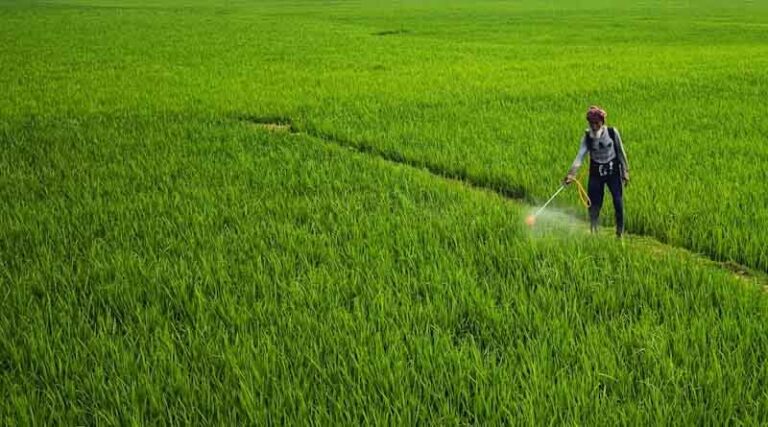
Is India’s Paddy Production on a Sustainable Growth Path? 5-Year Trends Say So
India’s Paddy Production: Area Crosses 514 Lakh Ha & Output Soars 1,490 Lakh Tonnes in 2024‑25
16 July 2025, New Delhi: India’s paddy cultivation has scaled new peaks in 2024-25, with total area under rice cultivation crossing 514.23 lakh hectares and production reaching an all-time high of 1490.74 lakh tonnes, according to the Third Advance Estimates released by the Department of Agriculture & Farmers Welfare (DA&FW). The yield, too, continued its steady ascent, touching 2899 kg/ha, reaffirming India’s position as one of the largest producers of rice globally.
Five-Year Growth Trend and Performance
Over the past five years (from 2020-21 to 2024-25), paddy cultivation has exhibited consistent growth across all three seasons — Kharif, Rabi, and Summer. A comparative analysis reveals the Compound Annual Growth Rate (CAGR) of 3.0% in area, 4.6% in production, and 1.6% in yield, signaling an efficient and upward shift in productivity.
Below is the complete summary of area, production, and yield for rice in India, segmented season-wise, along with the calculated five-year CAGRs:
All-India Rice Crop Estimates (Area in Lakh Ha, Production in Lakh Tonnes, Yield in Kg/Ha)
| Crop | Season | 2020-21 | 2021-22 | 2022-23 | 2023-24 | 2024-25 | CAGR (%) |
|---|---|---|---|---|---|---|---|
| Area | Kharif | 403.58 | 410.38 | 404.03 | 407.34 | 434.13 | 1.84% |
| Rabi | 54.11 | 52.40 | 43.28 | 40.76 | 44.74 | -4.69% | |
| Summer | – | 31.01 | 30.18 | 35.36 | – | – | |
| Total | 457.69 | 462.79 | 478.32 | 478.28 | 514.23 | 3.00% | |
| Production | Kharif | 1052.08 | 1110.01 | 1105.12 | 1132.59 | 1218.54 | 3.77% |
| Rabi | 191.60 | 184.71 | 150.04 | 146.01 | 156.72 | -4.89% | |
| Summer | – | 102.40 | 99.65 | 115.48 | – | – | |
| Total | 1243.68 | 1294.71 | 1357.55 | 1378.25 | 1490.74 | 4.60% | |
| Yield | Kharif | 2607 | 2705 | 2735 | 2780 | 2807 | 1.86% |
| Rabi | 3541 | 3525 | 3467 | 3582 | 3503 | -0.27% | |
| Summer | – | 3302 | 3302 | 3265 | – | – | |
| Total | 2717 | 2798 | 2838 | 2882 | 2899 | 1.64% |
Source: Department of Agriculture & Farmers Welfare (DA&FW), 3ʳᵈ Advance Estimates for 2024-25
Strong Contributions from Major Paddy-Growing States
Among all states, Uttar Pradesh emerged as the top contributor in terms of acreage with 74.25 lakh hectares under paddy cultivation in 2024-25. It was followed closely by West Bengal (55.9 lakh ha), Telangana (48.09 lakh ha), Madhya Pradesh (39.93 lakh ha), and Odisha (37.75 lakh ha).
These five states cumulatively account for over 50% of the total paddy area in India and play a vital role in ensuring food security, rice exports, and supply to India’s public distribution system (PDS).
Top 5 Paddy-Growing States in India (2024-25) – Area in Lakh Hectares
| Rank | State | Paddy Area (Lakh Ha) |
|---|---|---|
| 1 | Uttar Pradesh | 74.25 |
| 2 | West Bengal | 55.90 |
| 3 | Telangana | 48.09 |
| 4 | Madhya Pradesh | 39.93 |
| 5 | Odisha | 37.75 |
Kharif Season Leads Growth, Rabi Declines Marginally
The Kharif season continues to dominate rice cultivation in India, with a CAGR of 1.84% in area and 3.77% in production, backed by timely monsoons, increased procurement incentives, and resilient hybrid varieties. However, the Rabi season faced challenges, witnessing a decline in both area (-4.69%) and production (-4.89%), largely attributed to groundwater stress and changing climatic conditions in key regions.
Interestingly, yield during the Rabi season remained the highest among the three seasons, consistently averaging above 3500 kg/ha, reflecting the controlled irrigation and favorable agro-climatic conditions in many southern and eastern Indian states.
Summer Rice Gains Momentum
While Summer rice data has been captured only from 2021-22 onwards, there is a noticeable push in expanding cultivation during this season. The area increased from 30.18 lakh ha in 2022-23 to 35.36 lakh ha in 2023-24, accompanied by improved productivity, albeit with minor fluctuations.
Summer rice is gradually emerging as an important third crop, especially in states like Andhra Pradesh, Tamil Nadu, West Bengal, and Odisha, which are leveraging canal irrigation and shorter-duration rice varieties.
Yield Growth: A Modest but Steady Rise
Over five years, the national average yield of rice increased from 2717 kg/ha in 2020-21 to 2899 kg/ha in 2024-25, marking a CAGR of 1.64%. This modest rise reflects ongoing efforts by Indian agricultural scientists, state governments, and the private sector in promoting high-yielding varieties (HYVs), better pest and disease management, and nutrient efficiency through soil health cards and biofortified fertilizers.
Policy Implications and Outlook
India’s rice sector is at a pivotal point. With the country increasingly focusing on climate-resilient agriculture, sustainable water use, and doubling farmer incomes, the steady rise in paddy output provides a strong foundation.
However, challenges such as water scarcity, soil degradation, and the impact of El Niño and La Niña cycles on monsoons demand continued investment in research, agro-advisories, micro-irrigation, and diversification toward other nutritious grains.
As the country gears up to meet the needs of a growing population and global export demand, a balanced approach between productivity, environmental sustainability, and farmer profitability will be crucial.
Also Read: Bayer Launches Felujit: A Next-Generation Fungicide to Combat Sheath Blight in Paddy in India
📢 If You’re in Agriculture, Make Sure the Right People Hear Your Story.
From product launches to strategic announcements, Global Agriculture offers unmatched visibility across international agri-business markets. Connect with us at pr@global-agriculture.com to explore editorial and advertising opportunities that reach the right audience, worldwide.






